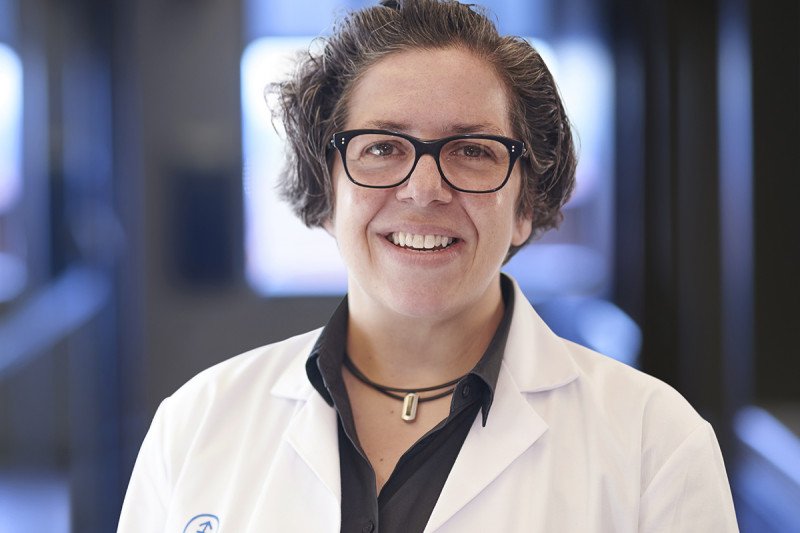
On March 17, 2021, scientists from around the world tuned in to watch the 2nd Annual Kravis WISE Symposium, a series of scientific talks sponsored by the Marie-Josée Kravis Women in Science Endeavor (WISE) at Memorial Sloan Kettering.
Launched in 2020, Kravis WISE is devoted to supporting women pursuing scientific training at Memorial Sloan Kettering. Each year in March — which is Women’s History Month — MSK hosts the Kravis WISE Symposium.
This year’s scientific speakers were Miriam Merad of Mount Sinai School of Medicine, Anne Brunet of Stanford University, Kat Hadjantonakis of MSK, and the 2021 Kravis WISE fellowship winners, Regina Bou Puerto and Mijin Kim.
Cancer, Aging, and More
Following an introduction by Ushma Neill, Vice President of Scientific Education and Training at MSK, the event kicked off with Dr. Merad. A specialist in cancer immunology and Director of the Precision Immunology Institute at Mount Sinai School of Medicine, Dr. Merad presented her research on immune cells called macrophages. These cells are often found infiltrating tumors where they can affect the anti-tumor immune response. Dr. Merad’s particular interest is in trying to use the understanding of macrophage biology in cancer immunotherapy to prevent the growth of invasive cancer.
Dr. Merad prefaced her scientific remarks by condemning the violence against Asian women in Georgia and urged her scientific colleagues to combat xenophobia in all its forms. She also drew attention to the disparate impact that childcare often has on women scientists (something the pandemic brought into stark relief) and applauded the Kravis WISE initiative for attempting to address this issue.
Meet Regina Bou Puerto, the 2021 Kravis WiSE Graduate Fellowship Winner
Next up was Regina Bou Puerto, winner of the Kravis WISE graduate student fellowship. Ms. Bou Puerto presented her work on interferon gamma and regulatory T cells in autoimmunity. Interferon gamma has typically been thought of as a pro-inflammatory cytokine, but Ms. Bou Puerto’s research suggests that this molecule can have opposite effects depending on the cell type producing it and the context in which it is produced. Ms. Bou Puerto is conducting her research in the Sloan Kettering Institute laboratory of immunologist Alexander Rudensky.
The third speaker of the day was Anne Brunet, Co-Director of the Paul F. Glenn Laboratories for the Biology of Aging at Stanford University. Dr. Brunet spoke about the role of chromatin changes in altering the migratory capacity of neural stem cells during aging and how this might be reversed. Another focus of her talk was the investigation of “suspended animation” in African Killifish, a species of fish that can survive droughts for years at a time, even though its typical lifespan is four to six months.
Meet Mijin Kim, the 2021 Kravis WiSE Postdoctoral Fellowship Winner
Mijin Kim, winner of this year’s Kravis WISE postdoctoral fellowship, was the next speaker. Dr. Kim discussed her work developing a nanosensor for the detection of ovarian cancer, a major killer of women. The nanosensor consists of a carbon nanotube that detects proteins in blood serum and emits detectable light. Dr. Kim is conducting this research in the SKI laboratory of chemist Daniel Heller.
In her introduction to Dr. Kim’s presentation, SKI faculty member Maria Jasin spoke of the devastating toll that ovarian cancer has taken on women in the scientific community — from Rosalind Franklin to Angelika Amon to Susan Lindquist — and the great promise that Dr. Kim’s research has for early detection.
Finally, the last speaker of the day was SKI Developmental Biology Program Chair Kat Hadjantonakis, who spoke about her research on differentiation of the early mammalian endoderm, the source of many of our internal organs. In collaboration with Dana Pe’er and others, Dr. Hadjantonakis has used single-cell analytics to decipher specific cell interactions in embryonic development and has helped scientists understand the role of such developmental pathways in contributing to cancer.
In her remarks, Dr. Hadjantonakis also paid tribute to Kathryn Anderson, the founding Chair of the Developmental Biology Program at SKI and a giant in the field who died last November.
The entire roster of speakers spoke of their gratitude to Marie-Josée Kravis for her support of women in science at MSK. Watch an interview with Marie-Josée Kravis speaking about why she created Kravis WISE.